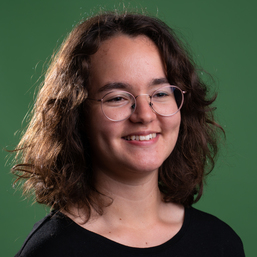
Is studying via a podcast the future of higher education?
Startup Anywyse develops a podcast that prepares students for their exams. This way, students experience less stress and studying becomes more fun, accoording to the makers. Is studying via audio the future? ‘University education is not about the passive absorption of knowledge, but it is also about the interaction between students and lecturers.’
Elisa den Ouden (19, student European Studies) is one of the first hundreds of students who already uses the podcast Anywyse. ‘It is a supplement,’ she says. ‘To understand the material, you really need to have participated in the lectures and tutorials.’
Anywyse helps her especially with reading literature. ‘Then I know the main points of the text and I can get through it more easily.’ She also understands the assignments better, such as questions about the goal of the author.
Julien Jukema developed the startup Anywyse together with his fellow student Carolina Posma. The podcast is made by the ‘smartest’ senior students who got at least an eight for the subject.

Peace and quiet with podcast
Students often listen to podcasts in their spare time anyway: about 73 percent of the students in the Netherlands listen to them. Jukema: ‘And then suddenly it is exam time and we are all forced to spend the entire day in the library, while we all know how bad that is for you.’
That is why the podcast must ensure that students start studying earlier. Jukema: ‘You're not going to open a book three weeks in advance. At least, I did not when I was a student. But you do listen to a podcast when you go to the supermarket anyway.’
He adds that learning via audio is also real practical for students with dyslexia (8 to 16 per cent in higher education). Students with dyslexia often have difficulty reading the material. ‘We hear from them that, for the first time, they don't feel stupid during exam time.’
Initially, Jukema wanted to develop an audio learning platform in cooperation with the UvA. ‘Everyone at the UvA we spoke with was super interested but it was not a high priority.’ So Jukema decided to take the faster route and raise private investment and offer the podcast to students herself. Anywyse focuses mainly on language studies, such as European studies and psychology. The first economics course is in development. Meanwhile, the startup has 1,100 users at the University of Applied Sciences Utrecht, Leiden and Amsterdam, Erasmus University and Radboud University.
As an additional benefit Jukema hopes that the podcast will give students more peace of mind. ‘Students want to be efficient all the time during exam time. They don't allow themselves the freedom to exercise, go for a walk or cook a healthy meal. That only increases their stress levels, it is a vicious circle.’
Podcast as a supplement
The podcast does not replace lectures and tutorials but complements them. Jukema: ‘There are students who only listen and pass exams, but that is not our approach.’ Jukema also calls it audio learning rather than a podcast because fragments are repeated more often, and questions are also asked. The students can easily switch subjects with short fragments of 10 to 15 minutes called Wysers.
The narrative voice of the Wysers regularly reminds you that you are doing well and that you will pass the exam. Jukema: ‘We find it important that there is one person who believes in you during the exam period anyway. And we hear from users that they feel more confident before an exam. People already talk negatively enough to themselves.’

Changing curriculum
Jesse van Amelsvoort, lecturer in Modern European Literature teaches the course European Literary Studies, the last course at the UvA for which Anywyse made a podcast. Amelsvoort himself didn't know that a podcast had been made about his subject. 'In principle it seems a nice way to learn via a podcast,’ he says on the phone.
But he does see that the curriculum changes every year. ‘A podcast will therefore not remain good and accurate forever.’ Van Amelsvoort also mentions another point of attention: ‘University education is not about passively absorbing knowledge, but it is also about the interaction between students and lecturers. And that students can bring forward their own points.’
According to PhD student Thijmen van Alphen, who researches student motivation and stress, cramming for an exam is a panic reaction. ‘Ideally you start studying in time and you don't have to cram before an exam. Preparation for an exam then consists only of repeating and refreshing. Besides a podcast, there are many other options to reduce stress, such as dividing up the study material, planning, and practising.’

According to Van Alphen, research indeed shows that higher self-efficacy (popularly called self-confidence) reduces stress. Van Alphen: ‘If someone constantly stimulates you to have a positive feeling about your own abilities, this can lead to more self-confidence. I only wonder whether the eventual dependence on an app is a good thing. Self-confidence is built up through success experiences. Personally, I would rather see students gain this from themselves.’
Cheap
Ultimately, Anywyse wants students to be able to make the podcast for each other. A kind of Wikipedia for learning subjects. You go to the website of Anywyse and choose the subject you like and want to explain.
Students pay three euros for one subject. That is fifteen to twenty fragments of ten to fifteen minutes. Jukema: ‘Our aim is to be super cheap. We want to make it accessible to all students and stay as far away from shadow education as possible.’
The next three weeks will be an exciting period for Anywyse: ‘We have to make sure that we have a thousand students by July the first. A lot depends on that as to whether and how we can continue.’



